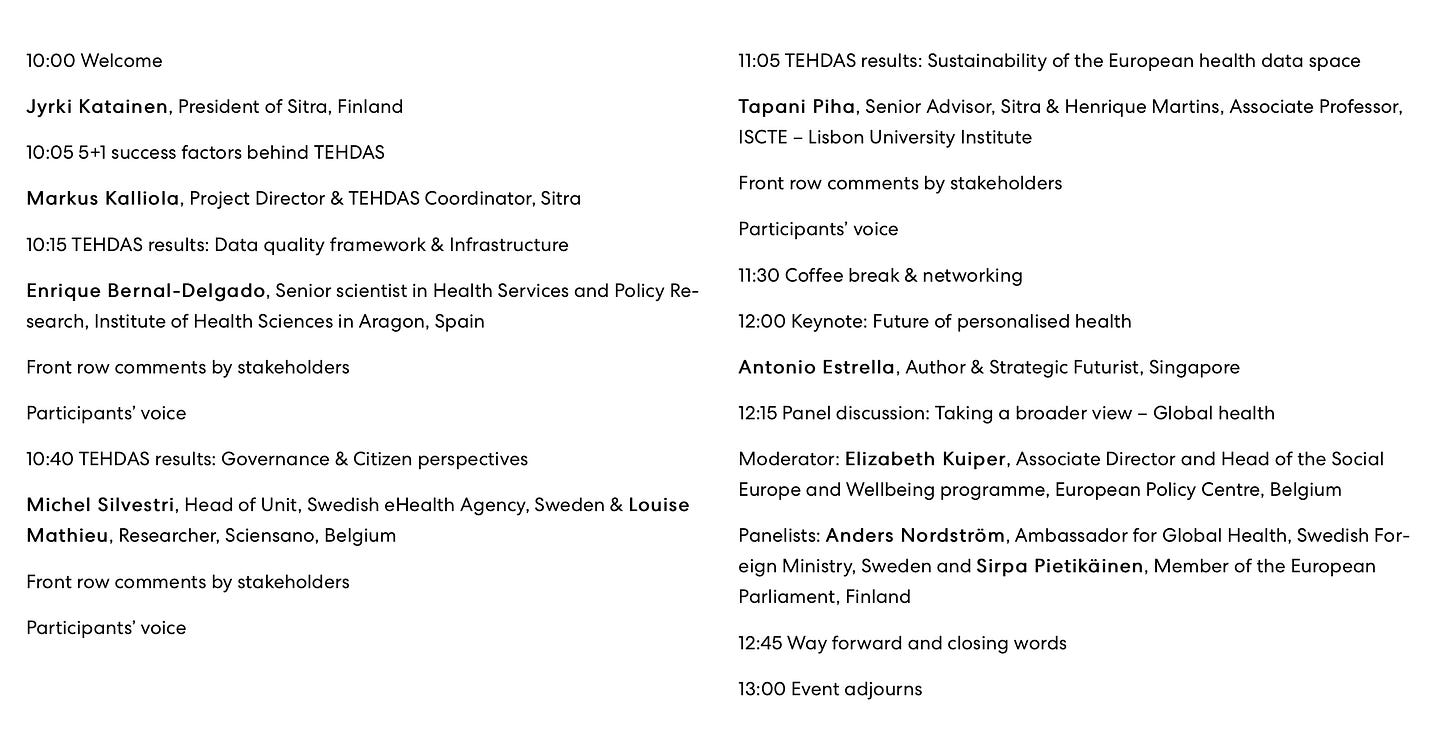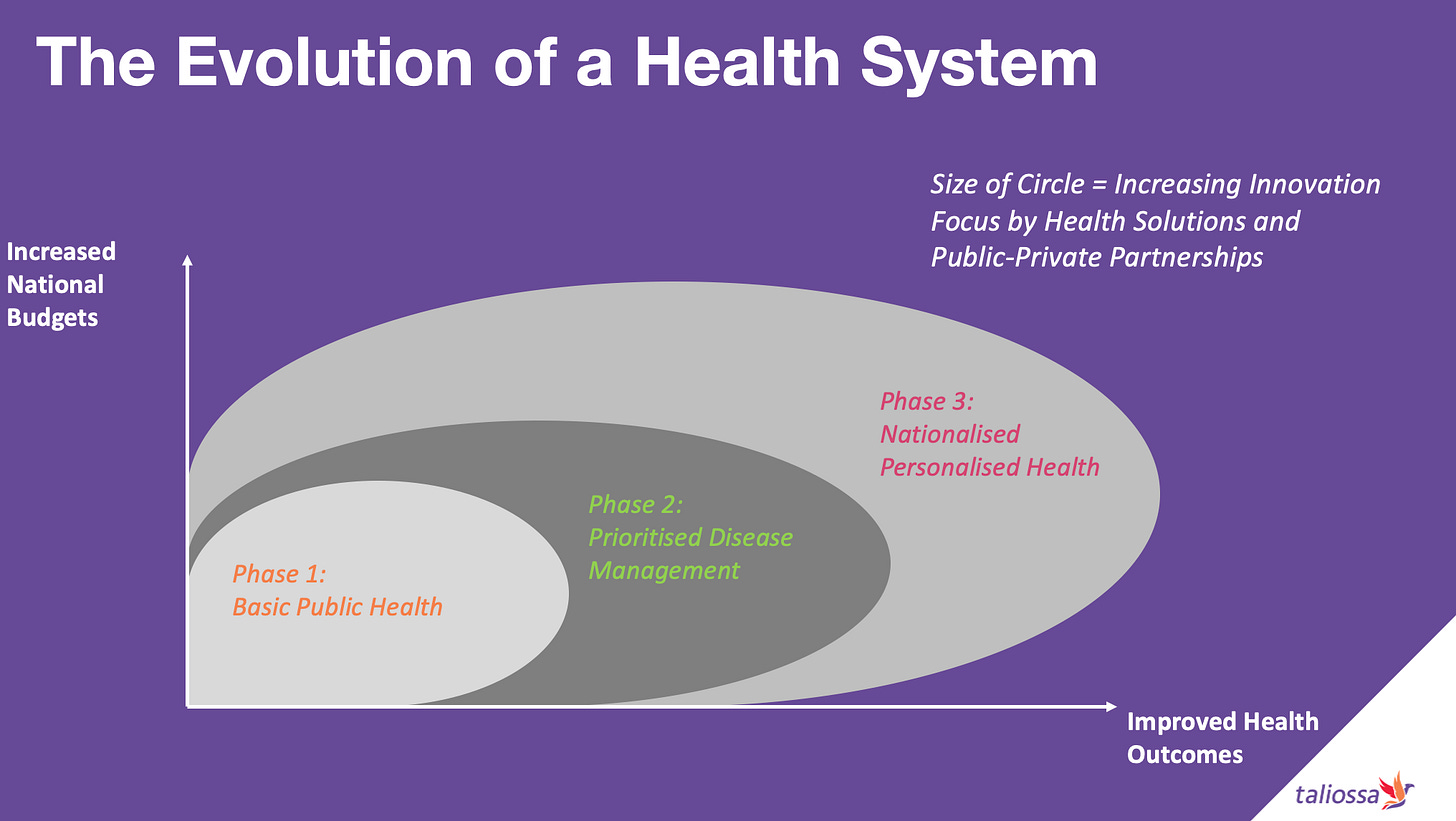Why A Common Data Approach from the EU Can Accelerate Health Innovation Globally
How a European Data Initiative can be a spark for greater personalisation and equality in healthcare
Earlier this month, I spoke at Radical Health Festival in Helsinki, including on keynote at an event hosted by TEHDAS, a programme across 25 European countries focused on joint action Towards the European Health DAta Space, which is coordinated by Sitra, the Finnish Innovation Fund.
With all the buzz on AI, and how this technology is driving global changes in the world around us, the discussion for how these 25 countries are coming together to create a foundation for common data standards caught my attention.
About TEHDAS
If you’re like me and haven’t been tracking TEHDAS with the same zeal as your favourite football league, Formula 1, or Eurovision, here’s a few facts:
TEHDAS started in Feb 2021 and runs until the end of July 2023
Its goal is “that in the future European citizens, communities and companies will benefit from secure and seamless access to health data regardless of where it is stored.”
The outputs of the project – including engaging citizens for their input - were to provide guidance on Data Quality, Governance, and Sustainability for the secondary use of Health Data
After watching the elegantly prepared summaries presented by a variety of policy makers, a hearty congratulations is in order achieving their stated goals.
Here’s the agenda for the conference, highlighting the work accomplished in the last 2 years.
Why does TEHDAS matter?
First, for any organisation that generates or uses health data, a clear public health structure for information helps enable greater scale.
For health systems, this is best summarised in the following diagram that I’ve developed for my talks on health systems.
Most leading health systems in the world in Phase 2 – creating the infrastructure for preventing and managing chronic disease that drive largest system costs, including introducing prevention programmes that are supported by health system budgets.
In the future, the aspiration for a shift to Nationalised Personalised Healthcare – Phase 3 – is to create national, fully funding prevention programmes, value-based care, and decisions that are made with long-term benefits and cost efficiencies.
Within Europe, the approach taken by TEHDAS for creating common standards for Quality, Sharing, Sustainability, and Governance in conjunction with citizens can create the foundation to achieve Phase 3 of National Personalised Healthcare. And in my view, there are other global opportunities also.
For Private Sector companies globally, Pharma and Genomic solutions for precision medicine, digital biomarkers and therapeutics, new models for home-based care, Autonomous AI for medical prediction and interpretation, and any other type of health innovation can achieve greater scale more quickly.
For individual health systems currently in Phase 1, learning and adopting the data standards used by the EU could be paramount to adopting the clinical evidence from CE Marks or the FDA – a validated approach to improving health outcomes from tools and interventions that meet a recognised regional benchmark.
And for other regional organisations like ASEAN in Southeast Asia, the approach by TEHDAS can be mirrored to accelerate other parts of the world to also help make data an enabler for future health innovations that bring personalisation and health equity.
What’s next for TEHDAS?
With parliamentary elections looming in Europe in 2024, there are a lot of priorities for existing Ministers of European Parliament to consider. But if the words of MEP Sirpa Pietikäinen reflect the interests of most other MEPs, a second phase of TEHDAS is a priority for Europe.
From the perspective of the Private Sector, I hope this next phase includes the input of not only more citizens to discuss Health Equity, but also from a cross-section of companies who can help provide the context for how they can work with EU data to bring about better health outcomes whilst maintaining the rapid development that comes with innovation.
Structured regional data for the EU can be like the fuel that powers cars. The best quality petrol or lithium-ion batteries operate better than those of average performance. I hope that the early returns from the collaborative work on TEHDAS can leads a new global benchmark for data.
Want to learn more?
Here are a few links that you might find helpful.
Podcasts featuring Tony Estrella (Website pages have links to all podcast players)
The FutureProofing Healthcare Podcast on Exploring the Data Challenges for Personalised Health - featuring Dr. Joanne Hackett and Dale Sanders
Digital Health Today featuring Paul Hughes from Underwrite Me - an example Private Sector company operating in the EU and Asia with a focus on Data
Prior Posts from Tony Estrella
Thanks for your attention!
If you found this helpful, I invite you to:



